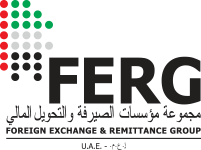FAQs
What is the Foreign Exchange and Remittance Group?
The Foreign Exchange and Remittance Group (FERG) is a non-profit organization comprising of businesses engaged in money exchange and remittance. The group was formed as an initiative of the Central Bank of the UAE.
What is the objective of FERG?
FERG is formed with an objective to bring in all service providers in the industry - from major companies with over 100 branches to single-branch companies, to a single platform, to understand their difficulties, concerns and discuss the outcomes as well as common issues within the industry.
What is FERG’s vision?
FERG aims to foster the development of a dynamic, innovative and stable foreign exchange and remittance industry that contributes to the economic and social wellbeing of our customers and position UAE as the market leader in money exchange and remittance business.
How many companies or service providers are part of FERG?
FERG membership includes all leading players from the industry. Currently, there are seventy members with over a thousand member branches.
What activities do FERG members undertake?
Group members operate in an industry which processes over $30 billion (AED 110 billion) worth of remittances annually, serving UAE’s entire expatriate community including all classes, ranging from blue-collared workers to high net worth individual customers, for their remittance requirements in their home country or various other investment purposes.
FERG members also provide multiple types of support which compliments the remittance business, such as credit card payments, savings schemes like national bonds, encashment of traveller cheques, Salik payments, mobile top-ups, etc., with an objective to offer one-stop shop facility to the consumers.
How long as FERG been in operation?
FERG, as an organization, was formed back in 2008. During this period, it emerged as the de facto voice of the money exchange and remittance industry in UAE.
Does FERG have the support of bodies in the public sector?
Yes, FERG was created as part of Central Bank of UAE’s initiative, and liaises closely with the regulatory body on a periodic basis. FERG is also registered with the Dubai Chamber of Commerce and Industry, the body tasked with supporting private sector activity in the UAE. In addition, FERG works closely with UAE’s law enforcement departments and has played a leading role in implementing and promoting anti-money laundering (AML) regulations.
How does FERG comply with UAE financial regulations?
FERG, as an organization through its members, not only complies with the UAE’s financial regulations, but also plays a significant role in providing information to the entire industry and works closely with most of its members to ensure all requirements and implementation are being promoted.
All companies within this industry, including the members of FERG are governed by strict anti-money laundering regulations (AML) as issued and monitored by the Central Bank of the UAE, their correspondent banks, and global leading regulators.
In addition, FERG has an active role and coordinates both with the Ministry of Labor [MOL] and Central Bank of UAE [CBU] during the development, testing phase and implementation of UAE’s Wage Protection System.
What has FERG accomplished to date?
FERG as an organization has played a pioneering role in reforming the UAE’s remittance and exchange sector by creating a platform to share common concerns with government and regulatory bodies.
The Group has taken up issues that have led to favourable policy amendments by the Central Bank of the UAE, promoted emiratization, and supported the implementation of the Wage Protection System.
FERG regularly liaises with national police departments to combat dubious financial transactions, and works with the Central Bank to implement strict AML policies.
FERG has also taken up issues with regulators in other countries to ease the process and interaction on a regular basis. The advantage is when representation is done from the association where the regulator is willing to listen to the voice of the stakeholders’ money exchange companies, which in this case benefits both the regulator and the industry itself.

